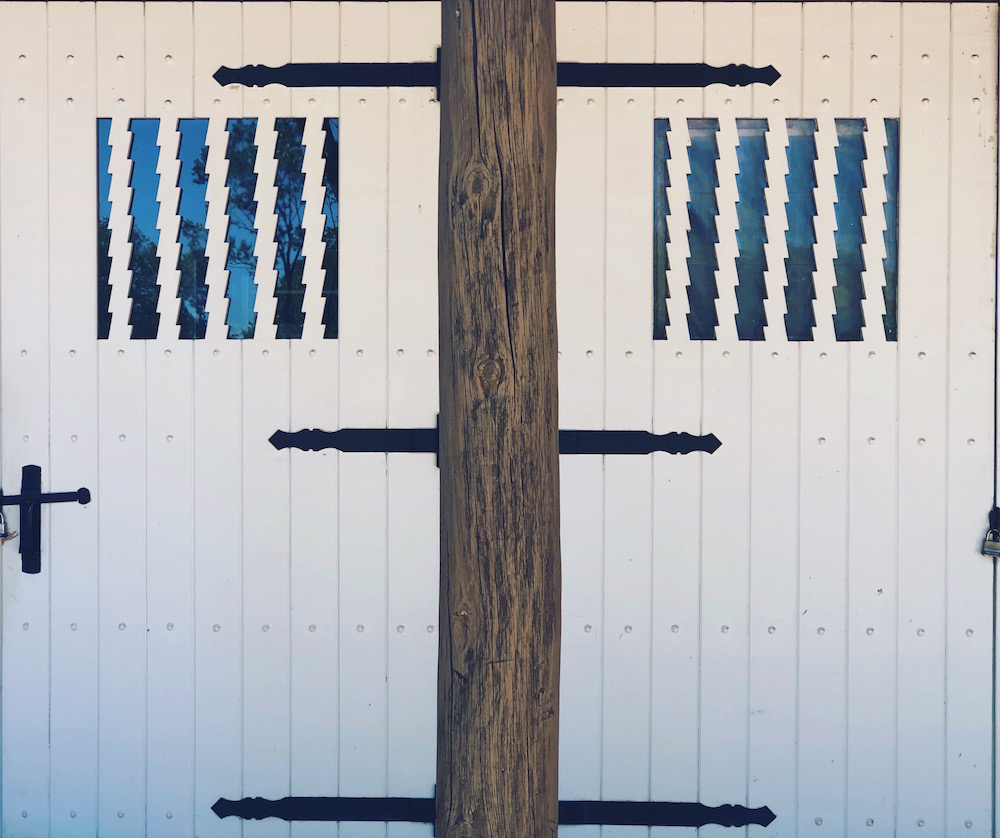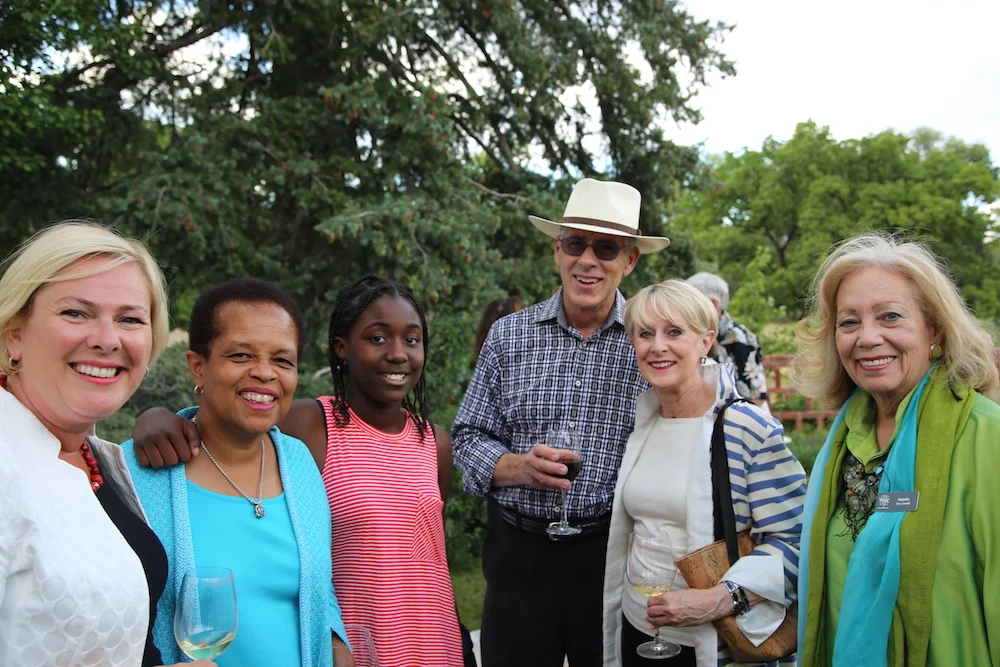Program Manager Jordan Young
Can you tell us the mission of Women's International Study Center and How it began?
Our mission is to inspire and enable women to achieve their goals. WISC was born out of three generations of women who built the Acequia Madre House. The founders of WISC were inspired by these women's achievements in arts, sciences, and cultural preservation, as well as their successes as businesswomen and in philanthropic efforts. To carry their spirit into the future, WISC created a fellowship-in-residence program and kicked off four years of public programming focused on changing women's lives by engaging in dialogue about issues that matter.
Fellows come and stay with us for a month, and we give them a stipend. We have a committee of scholars, artists, and professionals that evaluates the applications. Fellows do a public presentation about their work for the community. WISC wants to share their work with the world, and we often partner with other organizations to produce these events.
Why is it important to you personally?
Trained in poetry and philosophy with an unofficial side-study of psychoanalysis, I can be an introvert. The women of WISC have helped me see how important it is for us to take up space, to risk failure, to try to speak truth. I've been so lucky to be taught, fed, roused, upset, counseled, and schooled by the women teachers in my life, but my experiences at WISC have made me want to be more courageous. When you think that WISC's inaugural program was a conversation with the RBG…
Patriarchy is alive and well, and, as one of my favorite poets, Adrienne Rich, suggests, can interrupt our ability to be honest with each other as women. WISC values conversation — deep and meaningful conversations, conversations with people we don't agree with, conversations that make us uncomfortable.
I know and have felt the deep impact of these connections and the importance of intergenerational relationships among women. In each of WISC's endeavors, whether it be a symposium, the fellowship-in-residence program, or an international speaker, we strive for meaningful, inclusive dialogue and want to ask important questions.
What's the most rewarding part of the work?
As an artist myself, constantly in search of time and space to create, I love the fellowship program and what it offers. The women who founded and support WISC challenge me daily. One of the best things for me about Santa Fe has been cultivating intergenerational friendships. I learn so much from my board of directors, our members, our fellows, and our community — a few highlights: Dr. Leona Stucky, a friend and guide with the most incredible story of perseverance; Tarja Halonen, the former president of Finland who spoke only from a place of "we" and not "I"; Jacquette Timmons, one of our Women & Money speakers who taught me the importance of bravery around money; DS Magid, a playwright whose commitment to keeping art art inspires me every day … I could go on and on.
I just named some of the many women who make WISC a dynamic place. When I hear from former fellows or program attendees that we had an impact on their life — it makes me so proud. A young woman from Santa Fe Prep wrote an op-ed after hearing our program on Leadership from Values with Tarja Halonen and Halla Tomasdottir. When fellows engage with the incredible women of the Acequia Madre House, I am thrilled to see history ignite passion for the present. I also get to interview fellows periodically, and I love hearing about what they are up to and how they continue to grow.
Jacquette M Timmons, 2013
What's the most challenging aspect you have found so far?
WISC is celebrating its fifth anniversary this year; our past ambitions and programs surpassed our capacities. This is disappointing, but also a wonderful challenge to figure out how to operate WISC-quality programs and fellowships under a new set of parameters.
In saying that, we are scaling back our public programming and only focusing on the fellows. By promoting their fellowships and creating partnerships in the community around their projects, we can have as much public programming as what people were used to from WISC in the past.
Can you tell us about your fellowship-in-residency program?
We host fellowships with stipends year-round in a few focus areas: arts, sciences, cultural preservation, business, and philanthropy. This allows us to support a broad range of projects, in the spirit of the women of Acequia Madre House. You can find the application on our website, and a list of former fellows. I'm so proud of the diversity of projects that WISC has supported over the years.
Tarja Halonen, President of Finland 2000-2012
Have you seen impact in the Santa Fe community? How so?
Yes! Critical to our success and future planning is feedback from program participants, fellows, and volunteers. WISC seeks feedback from every program, allowing us to learn and grow. It is comments like these that make our hard work worth it:
On Women & Money breakout sessions:
"WISC has had a huge impact on my life. It made me a confident feminist and opened my eyes to the challenges women face in getting elected. I found an amazing job opportunity at a symposium and gained practical knowledge about how to start my career off on the right foot financially. So grateful for everything you do."
On Fellowships-in-Residence:
"As a direct result of my WISC residency, I was asked to assemble a new advisory board, lead the vision and collaborative programmatic design, and launch a women-of-color leadership initiative for the Santa Fe Community Foundation … I believe wholeheartedly that the work WISC is engaged in supports the path of scholars, artists, and businesswomen, and unfortunately — as valuable as this support is — it is the exception and not the norm."
On Women & Money symposia:
"I was moved and emboldened by what I learned as well as the sense of networks of strong women, not just in this city but in the world … I passed on what I learned — especially from Halla — to my closest women friends and colleagues. 'Don't ever let them tell you to be more like a man. Be a woman, and ask for what you're worth.'"
I love that the Fellowships-in-Residence program gives opportunities for groups of women to come together. It is exciting to see a project take flight, or become something new. Among other notable WISC Fellows are a 2015 group composed of the chair of the film department of the Santa Fe Community College, a teacher of bilingual film production at Monte del Sol charter school, a documentary film production and broadcast journalism professor at UNM, a Native American veteran of Hollywood, chairman of the New Mexico Film Resource, and a filmmaker and mentor. They gathered at WISC to plan the pilot year of the New Mexico Filmmakers Academy, a multi-organization enterprise serving women and people of color. Its goals are to maintain an affordable and accredited conservatory-style filmmaking pathway for New Mexicans; to stimulate economic development and job growth in the film and media industries in New Mexico; to provide New Mexican filmmakers access to statewide, national, and international film markets; and to encourage students to continue their goal of higher education to employment in New Mexico.
What's next for the organization?
As WISC celebrates its fifth year, we will continue to host incredible fellows from all over the world.
A few highlights:
In August, Renee Neblett and Elise McMahon of the Kokrobitey Institute in Ghana will be convening at WISC to plan their next projects: "For over 25 years the Kokrobitey Institute has hosted long- and short-term residential education programs at our campus in Kokrobitey, a fishing village an hour outside Accra, Ghana's capital. We are in an exciting and critical moment of development, having just completed the Alero Olympio Design Center, now the central facility for our new curriculums, projects, and recycled material product production, combining learning with income-generating activities. With this as our living example we are encouraging businesses to create community spaces throughout Ghana that act as resource centers with similar elements and curriculums. With this residency we will have time to develop the model, update our recycled product marketing and business plan, and develop future curriculums of our reoccurring sustainable design-focused education programs."
Composer Andrea Clearfield will join us in September: "I have been engaged in fieldwork recording folk melodies in Lo Monthang, Nepal, to help preserve the indigenous music and the endangered Mustangi dialect of Tibetan. Anthropologist Katey Blumenthal and I recorded 130 songs not previously documented. My project is to transcribe some of the recordings into musical notation in preparation for a songbook. The Tibetan fieldwork has inspired a new body of creative work: I will also compose a commission for the renowned classical guitarist, William Kanengiser (LA Guitar Quartet), as a re-imaging of the traditional Tibetan dramyin for classical guitar. This piece will reflect on my perspective on issues of musical and cultural identity as part of a larger project on 'Diasporas,' or scattered musical cultures."
In October WISC will host lawyer and scholar Dr. June Lorenzo: "Much of my work explores the impacts of colonialism on the place of the female in Pueblo peoples — not only female as women in society, but also the female in our epistemologies. Some work samples address different aspects of impacts of colonialism on the female in Pueblo societies: through the interaction of Spanish civil and Pueblo indigenous legal systems, and through attempts to interrupt the connection between our traditional housing and our matrilineal practices which connect us to our mother. I believe that further examination of Spanish colonial archives is crucial to this work and will spend time researching at the Spanish colonial archive collections in the New Mexico State Archives in Santa Fe."
What impact do you hope to have going Forward?
Gosh, isn't that the question for us? Can we really affect women's lives? Does anyone really change after attending a program? What can someone accomplish in one month anyway? For donors, for community members, for myself, it can be such a challenge to measure impact, and I can get bristly at our culture's obsession with data. I'd love to talk about a world where the creation of knowledge embraced wonder and mystery, unknown possibilities outside of the realms of prediction or control. How do we quantify the effect that a young woman deciding to pay off debt and start saving will have on her and her family? What does it mean in terms of impact for a writer to change her entire project after spending hours researching a topic?
It can be difficult to measure or pinpoint a change in someone's personal paradigm. I look at our current metrics from program evaluations, extensive surveys, and market research, and I see success ... but what really excites me are the comments, notes, and emails I receive, asking for deeper conversations and challenging us to ruffle a few more feathers.
Words: Jordan Young, Program Manager
This interview has been edited for clarity.







